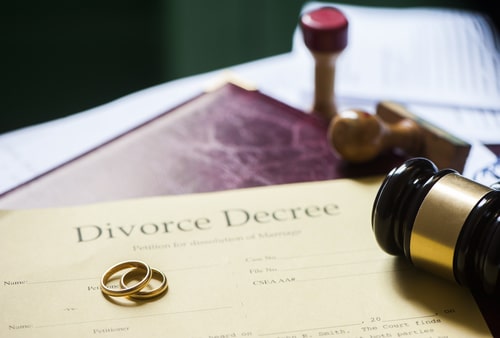Recent Blog Posts
Will It Affect My Illinois Divorce if My Ex Files First?
 Divorce is a complicated process. There are so many factors to take into consideration and steps that need to be completed that it can feel hard to keep track of it all. This is true even in the beginning stages of a divorce. How do you even begin divorce proceedings? Does it matter where you file for divorce? Does it matter who does? Below, we will examine any implications there may be regarding who files for divorce. Of course, a knowledgeable Aurora, IL divorce attorney can provide more detailed information that will be relevant to your specific case.
Divorce is a complicated process. There are so many factors to take into consideration and steps that need to be completed that it can feel hard to keep track of it all. This is true even in the beginning stages of a divorce. How do you even begin divorce proceedings? Does it matter where you file for divorce? Does it matter who does? Below, we will examine any implications there may be regarding who files for divorce. Of course, a knowledgeable Aurora, IL divorce attorney can provide more detailed information that will be relevant to your specific case.
Does It Matter Who Files First?
In the state of Illinois, whoever files first for divorce has no bearing on the proceedings that will follow. As Illinois is a no-fault divorce state, neither side should provide any reason other than “irreconcilable differences” for wishing to end the marriage. As such, there is no legal advantage to filing first since neither side needs to prove anything other than the fact that they simply cannot get along anymore.
Different Ways of Ending Marriage Explained
 Marriage is a major step in anyone’s life, but sometimes, people take that step before they are truly ready. Perhaps they felt pressured by their family, tradition, society, culture, or the person they were dating, but when someone enters a marriage before they are ready to do so, it can sometimes spell disaster. The good news is that an unhappy or unhealthy marriage is not a life sentence and there are ways to get out of it, and divorce is only one of them. If you are married and no longer want to be, you should consult a Batavia, IL divorce attorney to find out what your options are.
Marriage is a major step in anyone’s life, but sometimes, people take that step before they are truly ready. Perhaps they felt pressured by their family, tradition, society, culture, or the person they were dating, but when someone enters a marriage before they are ready to do so, it can sometimes spell disaster. The good news is that an unhappy or unhealthy marriage is not a life sentence and there are ways to get out of it, and divorce is only one of them. If you are married and no longer want to be, you should consult a Batavia, IL divorce attorney to find out what your options are.
How to End a Marriage in Illinois
Based on the specific circumstances of your marriage, you might go in one of three main directions to end your marriage:
Divorce
This is likely the most commonly known method for ending a marriage, but it can also be one of the most complicated processes to go through, depending on your dynamic with your spouse. Several factors can increase or reduce the amount of tension you might experience in your divorce. These include whether you have a contested or uncontested divorce, whether you have children, whether you have both been working and earning, whether one of you depends on the other’s income, whether this is a high-asset divorce, whether there is significant marital debt, and more. Regardless of the surrounding factors, a divorce means that there will be a public record that you once were married and now you are not, and this will be legally binding and recognized.
How Can an Illinois Divorce Order Be Enforced or Modified?
 Divorce can be a complicated process to go through in the best of times. It can be even more so if either of the ex-spouse’s circumstances change down the road. While divorce settlements generally address their future needs by stipulating what is expected of each spouse going forward, changed circumstances might make one of them unable to meet those expectations. If one spouse agrees to pay the other spousal support in their settlement and then loses their job, if the two share equal parental rights and visitation but then one gets relocated, or if one parent has primary custody but then becomes seriously ill and is unable to care for the child, these are all just a few of the many reasons why a divorce order might be modified. If circumstances in your life have changed and you think you need divorce order modifications, an Illinois divorce attorney can review the information and advise you on how to move forward.
Divorce can be a complicated process to go through in the best of times. It can be even more so if either of the ex-spouse’s circumstances change down the road. While divorce settlements generally address their future needs by stipulating what is expected of each spouse going forward, changed circumstances might make one of them unable to meet those expectations. If one spouse agrees to pay the other spousal support in their settlement and then loses their job, if the two share equal parental rights and visitation but then one gets relocated, or if one parent has primary custody but then becomes seriously ill and is unable to care for the child, these are all just a few of the many reasons why a divorce order might be modified. If circumstances in your life have changed and you think you need divorce order modifications, an Illinois divorce attorney can review the information and advise you on how to move forward.
5 Tips for an Illinois Divorce
 Divorce can be a complicated and emotionally draining process for anyone to go through. You are forced to make decisions about your future with the person you are breaking up with. While this can be painful in the moment, and you may feel unable to discuss things like asset division, spousal support, and child visitation, it is important that your divorce settlement will protect your best interests for years to come. If you are about to get divorced, a compassionate Batavia, IL divorce lawyer can advise you as you embark on this crucial path.
Divorce can be a complicated and emotionally draining process for anyone to go through. You are forced to make decisions about your future with the person you are breaking up with. While this can be painful in the moment, and you may feel unable to discuss things like asset division, spousal support, and child visitation, it is important that your divorce settlement will protect your best interests for years to come. If you are about to get divorced, a compassionate Batavia, IL divorce lawyer can advise you as you embark on this crucial path.
Tip 1: Make Sure You Have a Thorough Understanding of Your Finances
Your finances can be significantly affected by a divorce, and they can also determine how various aspects of divorce will be settled. Start collecting financial documentation to make sure you have a good understanding of your and your spouse’s income, assets, expenses, and debts.
Deciding What to Do with Your Family Home in a Divorce
 A couple going through a divorce needs to figure out all the ways their marital assets and property will be equitably divided. While you might think that getting more things in a settlement equals more value, there are other things to consider. Some assets and properties might actually end up costing you money. If you can afford to handle the added costs on your one, that might not be a problem. If you will not be able to cover all these costs, you might find that it would serve your best interests not to take some assets in your divorce. If, for example, you are trying to decide whether you want to keep your family home in your divorce, a knowledgeable St. Charles, IL divorce lawyer can help you understand what the added costs will be and whether it is something financially viable for you.
A couple going through a divorce needs to figure out all the ways their marital assets and property will be equitably divided. While you might think that getting more things in a settlement equals more value, there are other things to consider. Some assets and properties might actually end up costing you money. If you can afford to handle the added costs on your one, that might not be a problem. If you will not be able to cover all these costs, you might find that it would serve your best interests not to take some assets in your divorce. If, for example, you are trying to decide whether you want to keep your family home in your divorce, a knowledgeable St. Charles, IL divorce lawyer can help you understand what the added costs will be and whether it is something financially viable for you.
What Are Your Options?
Figuring out what to do with the family home is one of the most difficult considerations for a couple getting a divorce. There are several options for how this can turn out:
Can I Stop Paying Child Support if I Lost My Job?
 The process of reaching a divorce settlement can be complicated. There are the things both sides know, and there are things that they do not. For one thing, one spouse might be hiding some information from the other. But the truth is that no one can predict the future, and unforeseen changes in the spouses’ lives can make the divorce settlement no longer relevant a few years later. If, for example, one spouse was gainfully employed when the divorce was finalized and agrees to a settlement that includes considerable child support payments, but then that same spouse loses their job, it can confuse matters. If you have lost your job and are concerned you will be unable to make your child support payments, a St. Charles, IL divorce lawyer can guide you through this difficult time.
The process of reaching a divorce settlement can be complicated. There are the things both sides know, and there are things that they do not. For one thing, one spouse might be hiding some information from the other. But the truth is that no one can predict the future, and unforeseen changes in the spouses’ lives can make the divorce settlement no longer relevant a few years later. If, for example, one spouse was gainfully employed when the divorce was finalized and agrees to a settlement that includes considerable child support payments, but then that same spouse loses their job, it can confuse matters. If you have lost your job and are concerned you will be unable to make your child support payments, a St. Charles, IL divorce lawyer can guide you through this difficult time.
Child Support Modifications
According to Illinois law, child support arrangements can be modified under certain circumstances. If the paying parent’s income has decreased or stopped unexpectedly, this would generally be considered a reasonable case for child support modification. However, if this change to the parent’s income is voluntary - e.g., if they quit their job - this would not meet the criteria.
Is Traveling with Children OK During a Divorce?
 Family trips are an excellent opportunity to enjoy some quality time together. When parents are getting a divorce, it can be especially important to get the children out of their daily routine and let them have a bit of a break from what might be a stressful situation. Are there any laws preventing you from taking your kids on vacation while your divorce from their other parents is not yet finalized? Is it legal to block out several days for a trip before you and your spouse have settled on a custody arrangement? A knowledgeable Yorkville, IL divorce lawyer can answer all these questions.
Family trips are an excellent opportunity to enjoy some quality time together. When parents are getting a divorce, it can be especially important to get the children out of their daily routine and let them have a bit of a break from what might be a stressful situation. Are there any laws preventing you from taking your kids on vacation while your divorce from their other parents is not yet finalized? Is it legal to block out several days for a trip before you and your spouse have settled on a custody arrangement? A knowledgeable Yorkville, IL divorce lawyer can answer all these questions.
Is It a Legal Problem to Travel With Kids During a Divorce?
Generally speaking, when a couple gets married and has kids, the law does not get involved in how they decide to raise their children as long as the children are not harmed. If one parent has a job where they need to work during the holidays - like an emergency room nurse, for example - the other parent can take their children to spend the holidays with grandparents or cousins. If one parent has limited vacation days and the other parent does not work or has a job where they have the same days off as their children - a school teacher, for example - the second parent might take the kids on trips without their spouse.
I Had an Affair. Will This Impact My Illinois Divorce?
 Every state has its own set of rules and laws about divorce. This is true for asset division, custody arrangements, and even what is considered acceptable grounds for divorce. The State of Illinois is now considered a “no-fault state,” and irreconcilable differences are the only reason a court will accept for ending a marriage. This means neither spouse has to prove that the other is responsible for breaking up the marriage. In general terms, an affair will not necessarily affect the outcome of your divorce. If you cheated on your spouse, you should speak with a knowledgeable Oswego, IL divorce lawyer to determine how best to protect your rights and interests.
Every state has its own set of rules and laws about divorce. This is true for asset division, custody arrangements, and even what is considered acceptable grounds for divorce. The State of Illinois is now considered a “no-fault state,” and irreconcilable differences are the only reason a court will accept for ending a marriage. This means neither spouse has to prove that the other is responsible for breaking up the marriage. In general terms, an affair will not necessarily affect the outcome of your divorce. If you cheated on your spouse, you should speak with a knowledgeable Oswego, IL divorce lawyer to determine how best to protect your rights and interests.
What Does “No-Fault” Mean?
Before Illinois became a no-fault state in 2016, people who wanted a divorce needed to appeal to the court and explain why. To be granted a divorce, they needed to prove why they deserved one. Once Illinois switched to the new policy, the only valid reason the courts would recognize for granting a divorce was irreconcilable differences. This broad title can include numerous things, and proving that you have such differences with your spouse is not especially difficult
Could a Collaborative Divorce Be the Right Step for Me?
 You might be surprised to learn that there are several different ways that a marriage can legally end. For example, couples can split up through a typical divorce process in family court, an uncontested divorce, legal separation, or mediation. Another less common method for ending a marriage is called collaborative divorce. This can be a great option for couples who have the resources necessary. Suppose you and your spouse do not wish to stay married but want to avoid the animosity that is sometimes characteristic of a typical divorce. In that case, you should speak with a collaborative divorce lawyer in Geneva, IL, to learn more
You might be surprised to learn that there are several different ways that a marriage can legally end. For example, couples can split up through a typical divorce process in family court, an uncontested divorce, legal separation, or mediation. Another less common method for ending a marriage is called collaborative divorce. This can be a great option for couples who have the resources necessary. Suppose you and your spouse do not wish to stay married but want to avoid the animosity that is sometimes characteristic of a typical divorce. In that case, you should speak with a collaborative divorce lawyer in Geneva, IL, to learn more
What Does Collaborative Divorce Mean?
Unlike a typical divorce that plays out in family court, collaborative divorce is a good alternative for people who want to avoid litigating their divorce in court. The spouses involved can build up a team of professionals from many different fields of expertise to help the process move along with less antagonism than is often seen in divorce. These professionals can include mediators, child psychologists, accountants, asset division specialists, and lawyers. They cannot use the same lawyer; each side must hire their legal representation.
Should I Consider Signing a Postnuptial Agreement?
 When a married couple splits, their divorce settlement must cover several topics. Their division of marital assets, spousal support, and the future of their marital home are just a few. When couples begin their divorce proceedings already equipped with a prenuptial agreement they signed before they ever got married, it can make everything go much smoother and quicker. Couples who never signed a prenup but realize once they are already married that it might have been a good idea often sign something very similar, a postnuptial agreement. If you are married and wish you had signed a prenup, you should speak with an Aurora, IL divorce lawyer to discuss whether a postnuptial agreement might be advisable.
When a married couple splits, their divorce settlement must cover several topics. Their division of marital assets, spousal support, and the future of their marital home are just a few. When couples begin their divorce proceedings already equipped with a prenuptial agreement they signed before they ever got married, it can make everything go much smoother and quicker. Couples who never signed a prenup but realize once they are already married that it might have been a good idea often sign something very similar, a postnuptial agreement. If you are married and wish you had signed a prenup, you should speak with an Aurora, IL divorce lawyer to discuss whether a postnuptial agreement might be advisable.
What Is a Postnuptial Agreement?
When people get married, they merge their lives together. They live together, plan together, and accumulate assets together. Many couples have a happy, healthy marriage and stay together for the rest of their lives. However, because it is a known fact that many marriages end in divorce, some people choose to prepare themselves “just in case” it happens to them too. A prenuptial agreement is almost like a contract signed before the marriage begins that will only be enforced if the marriage ends.









